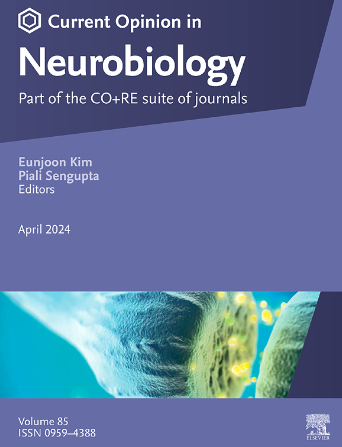向内感受和心理健康的多学科神经生物学迈进
IF 5.2
2区 医学
Q1 NEUROSCIENCES
引用次数: 0
摘要
内感受是神经系统感知、解释和整合内部生理信号的过程,对健康至关重要,在维持体内平衡的脑-体反馈循环中发挥着关键作用。内感受加工的中断在精神疾病中很常见,突出了其与诊断、预后和治疗的相关性。本文回顾了近期内感受研究的转化进展,重点关注焦虑症、抑郁症、饮食失调和功能性胃肠道疾病,其中内感受信号的改变有助于核心症状。我们讨论了从动物模型中获得的细胞和分子的新见解,并解决了将这些发现转化为人类精神病理学的障碍。为了弥补这一差距,我们提出了一种“流动透镜”方法,这是一种多学科框架,可以动态地整合跨生物尺度、物种和方法的发现。在这里,多学科指的是基于团队的合作,在这种合作中,多个领域为一个共同的问题贡献了互补的专业知识,而没有完全消除学科界限。通过将机械动物研究与人类临床洞察结合起来,这种方法可以促进内感受神经科学的发展,并为精神疾病提供新的治疗策略。本文章由计算机程序翻译,如有差异,请以英文原文为准。

Toward a multidisciplinary neurobiology of interoception and mental health
Interoception, the process by which the nervous system senses, interprets and integrates internal physiological signals, is fundamental to health, playing a key role in brain-body feedback loops that maintain homeostasis. Disruptions in interoceptive processing are common across psychiatric disorders, highlighting its relevance for diagnosis, prognosis, and treatment. This review examines recent translational advances in interoception research, with a focus on anxiety disorders, depression, eating disorders, and functional gastrointestinal disorders, where altered interoceptive signaling contributes to core symptoms. We discuss emerging cellular and molecular insights from animal models and address barriers to translating these findings to human psychopathology. To bridge this gap, we propose a “roving lens” approach, a multidisciplinary framework that dynamically integrates findings across biological scales, species, and methods. Here, multidisciplinary denotes team-based collaboration in which multiple fields contribute complementary expertise to a shared question, without fully dissolving disciplinary boundaries. By uniting mechanistic animal research with human clinical insight, this approach can advance interoceptive neuroscience and inform novel therapeutic strategies for psychiatric disorders.
求助全文
通过发布文献求助,成功后即可免费获取论文全文。
去求助
来源期刊

Current Opinion in Neurobiology
医学-神经科学
CiteScore
11.10
自引率
1.80%
发文量
130
审稿时长
4-8 weeks
期刊介绍:
Current Opinion in Neurobiology publishes short annotated reviews by leading experts on recent developments in the field of neurobiology. These experts write short reviews describing recent discoveries in this field (in the past 2-5 years), as well as highlighting select individual papers of particular significance.
The journal is thus an important resource allowing researchers and educators to quickly gain an overview and rich understanding of complex and current issues in the field of Neurobiology. The journal takes a unique and valuable approach in focusing each special issue around a topic of scientific and/or societal interest, and then bringing together leading international experts studying that topic, embracing diverse methodologies and perspectives.
Journal Content: The journal consists of 6 issues per year, covering 8 recurring topics every other year in the following categories:
-Neurobiology of Disease-
Neurobiology of Behavior-
Cellular Neuroscience-
Systems Neuroscience-
Developmental Neuroscience-
Neurobiology of Learning and Plasticity-
Molecular Neuroscience-
Computational Neuroscience
 求助内容:
求助内容: 应助结果提醒方式:
应助结果提醒方式:


